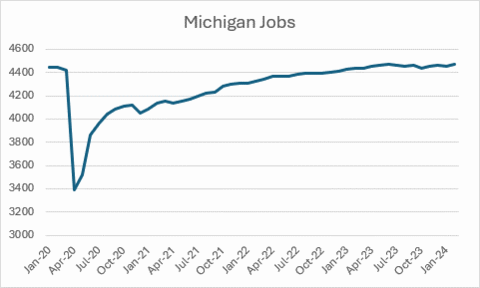Anti-DEI organization launches training option for state-required training
Gov. Gretchen Whitmer added DEI requirement to licensing requirements for physicians, nurses, other professionals
Editor’s note: We have added a response from the Department of Licensing and Regulatory Affairs that arrived after this story went live.
An organization critical of a new occupational mandate for health care professionals found an unusual way to advance its mission and reach potential supporters: develop a program that helps people comply with the mandate.
Gov. Gretchen Whitmer used an executive order in August 2020 to require health care professionals to receive training in implicit bias as a condition of being able to work legally. The state public health code defines implicit bias as “an attitude or internalized stereotype” that leads to unequal treatment based on a person’s race, ethnicity, or one of many other characteristics.
Many types of entities can provide the training, including state agencies and universities. Others include those that specialize in diversity, equity and inclusion, or are nationally recognized health-related organizations.
Enter Do No Harm, founded and led by Dr. Stanley Goldfarb, a noted physician and academic expert in nephrology. Goldfarb is no fan of implicit bias training, calling it “ideological claptrap” in a Wall Street Journal op-ed of April 26. Diversity programs in medical school and other health-related organizations, he wrote in a May 2023 article for The Free Press, are “undermining healthcare for all patients regardless of status.”
Goldfarb used the Journal op-ed to announce that Do No Harm created a continuing education course for Michigan health care professionals who are subject to the training mandate. Six other states have a similar mandate, Goldfarb wrote, though he wrote that Michigan’s is among the most expansive. He hopes his organization’s training will be the default method by which Michigan health professionals comply with the mandate.
The training, which Do No Harm will launch May 1, is composed of three one-hour sessions, which are spread over three years.
Part one includes the following topics:
- “Definitions for ‘implicit bias’
- Research on implicit bias
- Implicit Association Test (IAT)
- Definitions for ‘health equity’”
Part two includes these topics:
- “Anti-racism and how it manifests in healthcare and education
- Serving a diverse population; ‘cultural competency’
- How to mitigate the negative effects of implicit bias concepts”
These two parts satisfy the LARA requirement, with a third one-hour class available for physicians and nurses who need yet another training session.
More than two dozen professions are subject to the requirement, including nurses, physicians, pharmacy technicians, social workers, speech-language pathologists and athletic trainers. It is required of everyone who seeks a new license or to renew an existing one.
The mandate may have caused some health care workers to leave the field. “We heard from some who were close enough to retirement that they chose to leave their professions earlier than they planned because they were not willing to go along with the mandate,” Laura Morgan, program manager at Do No Harm, told CapCon in an email.
Anyone who completes a course that satisfies the requirement must retain it for six years after applying for licensure, registration or renewal. Given that some licenses are good for only two years, some individuals will need to retain multiple completion certificates.
A spokesperson from the Department of Licensing and Regulatory Affairs responded to an emailed request for comment.
“Licensees are required to maintain documentation of completing the implicit bias training for six years as the license cycles for the licensees required to take the training range from 2 to 4 years,” wrote Abby Rubley, director of communications. “As the implicit bias training requirement is maintained in the Public Health Code General Rules, it impacts most Public Health Code licensees,” she continued.
“Please note the Department does not pre-approve training programs,” Rubley added. “We recommend that applicants refer to the standards that have been established in rule for guidance on what is acceptable.”
Michigan Capitol Confidential is the news source produced by the Mackinac Center for Public Policy. Michigan Capitol Confidential reports with a free-market news perspective.



